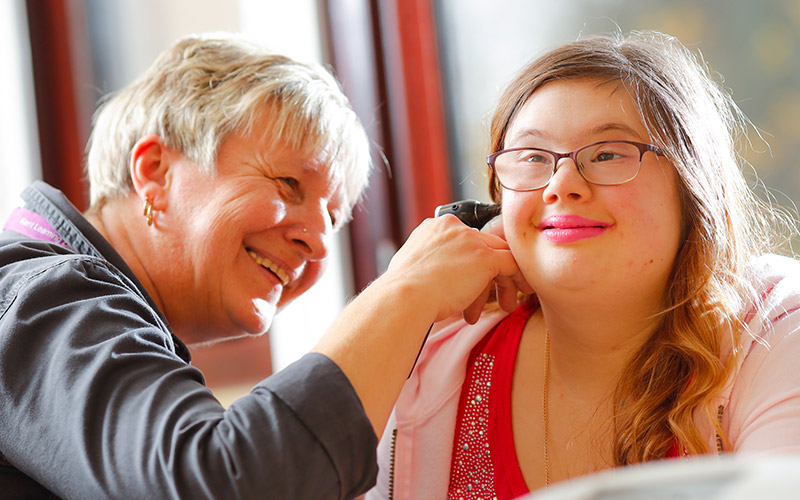Nursing with hearing loss and the fight to succeed
By Penny Clark, Clinical Disability Lead
 Penny was born with a genetic condition called Sticklers Syndrome and birth defect, Pierre Robin Syndrome resulting in hearing loss.
Penny was born with a genetic condition called Sticklers Syndrome and birth defect, Pierre Robin Syndrome resulting in hearing loss.
She has recently developed Functional Neurological Disorder (FND) resulting in the loss of her voice.
Here, Penny opens up about navigating a nursing career with a disability and how reasonable adjustments allow her to overcome barriers and excel in a career that she loves.
Having 35 surgeries on my ears as a child and adult, I now wear a cochlear implant on the left and a bone conduction hearing aid on my right. Without them, I have total hearing loss.
My parents sent me to a mainstream school. It was done in the best faith, but resulted in a sense of displacement as I didn’t learn to sign, or know any other children ‘like me’.
The strongest memories of my childhood were feelings of anger, isolation and a bereavement for the life I could’ve had.
I’ve always been determined, so I pushed back against the prejudice and got myself to university.
There, hoping for broader minds, I was met with the same friction as school. I had a few tutors who categorically refused to use radio mics to amplify. I fell behind on work and had to repeat modules.
Out on placement, I struggled to lipread the surgeons who had masks on. One of them threw me out of the theatre room and told everyone I was incompetent.
Despite these setbacks, I passed my nursing degree and 20 years ago, KCHFT took a chance on me. The interview was tough, there was no such thing as reasonable adjustments back then and much of it was spent proving how I could work as a nurse, without my hearing.

Penny's NHS-blue hearing aid
Throughout the course of my career, things have evolved and changed. I now have access to an iPhone for work that I can Bluetooth to my implant and being able to opt out of in-person meetings and stick to Microsoft Teams with the chat function.
If I was to give anyone some top tips, I’d say a hearing aid is not like a pair of glasses – it will not give you perfect hearing, it just makes things a little better.
It’s not just about listening, either. Hearing loss is a mixture of context, hearing, lip reading and guess work, I never hear the full sentence but generally can get the gist of what is being said by key words and then I piece it all together. I need more time to process an answer.
"It has become more difficult recently, as I have also been diagnosed with Functional Neurological Disorder which means I experience tics, seizures and have lost the ability to use my voice.
My colleagues have rallied around so I can continue to do my work. This includes taking on some face-to-face meetings and ensuring I don’t have to drive. I am also hoping to get hold of the technology to help me to communicate without the use of my voice, soon.
Working in the learning disability field is made for me. I bring life experience, empathy and understanding. I am also an approachable, level-headed manager and a methodical person, who never misses a detail.
While hearing loss has had a large impact on my life, with the latest technology available to us, it shouldn’t mean I am left out of the workforce.
My tips for communicating with a person with hearing loss:
- never sit with a window behind you, it makes lip reading impossible
- face the person you are talking to
- don’t cover your face or mouth
- reduce background noise
- repeat or rephrase
- don’t shout, it just distorts things more.




